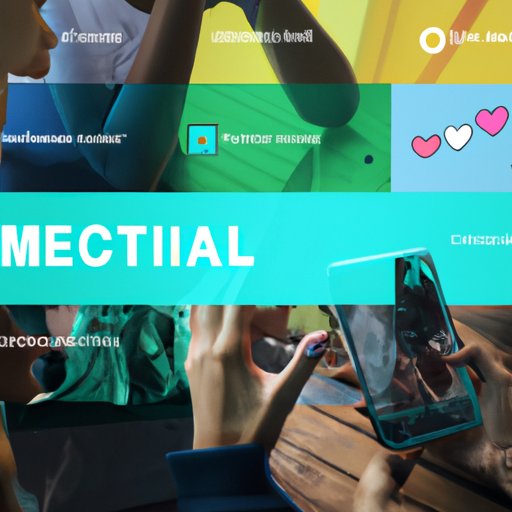Introduction
Social media has become an integral part of our lives, with over 3 billion people worldwide using it to connect, communicate, and share their lives with friends and family. But how does this ubiquitous presence of social media affect our mental health? In this article, we will explore how social media impacts our mental health, including its effects on self-esteem, anxiety levels, and depression. We will also examine the role of social media in cyberbullying and provide tips for managing social media use and mental health.
Analyzing the Relationship Between Social Media and Mental Health
It is important to understand the relationship between social media and mental health before exploring its effects. While there are both positive and negative aspects of using social media, it is important to note that the overall impact on mental health depends on individual usage patterns and psychological factors. Additionally, some platforms may have different effects than others – for example, the impact of Instagram may be different from the impact of Twitter.

How Social Media Can Impact Mental Health Positively
Social media can have a positive effect on mental health by providing users with a platform to express themselves, connect with others, and share their thoughts and experiences. Studies have found that using social media can reduce feelings of loneliness and isolation, as well as increase self-confidence and self-esteem. Additionally, many users find comfort and support from online communities and groups, which can help them cope with difficult times in their life.

How Social Media Can Impact Mental Health Negatively
On the other hand, social media can also have a negative effect on mental health. Excessive use of social media can lead to feelings of envy, low self-esteem, and anxiety. Additionally, comparing oneself to others on social media can lead to depression, and cyberbullying can have serious consequences for those who are victims of it.
Examining the Pros and Cons of Social Media and Mental Health
In order to better understand the effects of social media on mental health, it is important to examine both the pros and cons. Here are some of the potential benefits and drawbacks associated with social media use:
Pros of Social Media on Mental Health
- Provides a platform for self-expression
- Allows users to connect with others
- Can reduce feelings of loneliness and isolation
- Allows users to find support from online communities and groups
- Increases self-confidence and self-esteem
Cons of Social Media on Mental Health
- Can lead to feelings of envy, low self-esteem, and anxiety
- Comparisons to others can lead to depression
- Cyberbullying can have serious consequences
- Can lead to excessive use of social media
- Lack of face-to-face interactions
Exploring the Impact of Social Media on Self-Esteem
One of the most common ways that social media can affect mental health is through its impact on self-esteem. Selfies, or pictures of oneself taken for the purpose of sharing on social media, can either boost or harm self-esteem depending on how they are used. On one hand, selfies can be a way for users to show off their accomplishments or celebrate their successes. On the other hand, they can also lead to comparisons of oneself to others, resulting in feelings of inadequacy or low self-esteem.

Investigating How Social Media Influences Anxiety Levels
Another way that social media can affect mental health is by influencing anxiety levels. The fear of missing out (FOMO) is a common feeling among social media users, causing them to feel anxious about not being included in events or conversations taking place on social media. Cyberbullying is another issue that can cause anxiety in those affected by it. Additionally, social media addiction can lead to increased levels of stress and anxiety.
Understanding the Effects of Social Media on Depression
Social media can also have a negative impact on depression. Excessive use of social media can lead to feelings of isolation, as users spend less time engaging in real-life activities and more time on their devices. Additionally, unhealthy comparisons to others on social media can cause feelings of worthlessness or hopelessness. Finally, lack of face-to-face interactions can contribute to feelings of depression.

Examining the Role of Social Media in Cyberbullying
Cyberbullying is a growing problem, and social media plays a major role in it. Cyberbullying is defined as the use of technology to harass, threaten, embarrass, or target another person. Warning signs of cyberbullying include changes in mood or behavior, withdrawal from activities, and avoiding social media. If you suspect someone is being cyberbullied, it is important to take action, such as talking to the person, reporting the incident to the social media platform, and seeking professional help if needed.
Conclusion
In conclusion, social media can have both positive and negative effects on mental health. While it can provide a platform for self-expression and connection with others, it can also lead to feelings of envy, low self-esteem, and anxiety. Additionally, unhealthy comparisons to others and cyberbullying can further contribute to mental health issues such as depression and anxiety. To manage the impact of social media on mental health, it is important to practice moderation, set boundaries, and seek professional help if necessary.
(Note: Is this article not meeting your expectations? Do you have knowledge or insights to share? Unlock new opportunities and expand your reach by joining our authors team. Click Registration to join us and share your expertise with our readers.)
